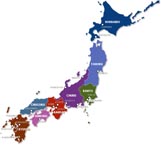Japan's ruling party faces critical challenge in August
 Tokyo - Japan may see a change in ruling parties for the first time in more than half a century in August, when Prime Minister Taro Aso's Liberal Democratic Party (LDP) is expected to face a strong challenge from the opposition Democratic Party of Japan (DPJ).
Tokyo - Japan may see a change in ruling parties for the first time in more than half a century in August, when Prime Minister Taro Aso's Liberal Democratic Party (LDP) is expected to face a strong challenge from the opposition Democratic Party of Japan (DPJ).
The crisis for the conservative LDP has intensified since it lost an important local election on Sunday along with its coalition partner, the New Komeito, in the Tokyo metropolitan assembly. It was the latest in a series of defeats in local elections for the LDP.
Sunday's loss prompted Aso to dissolve the nation's House of Representatives before its term was to end on July 21, meaning an election will most likely be held on August 30.
The DPJ, which won a majority in the assembly in Japan's capital, is now ready to seize the momentum to become the nation's largest party and break the stranglehold the LDP has held on Japanese politics since 1955.
It also submitted a no-confidence resolution against Aso's cabinet and a censure motion against the prime minister in the House of Councillors on Monday, along with three other opposition parties.
Aso has suffered low approval ratings since he took office in September last year, suffering from several high-profile political gaffs. His status has also taken a beating due to the poor performance of his ministers, including former finance minister Shoichi Nakagawa who appeared to be drunk at a Group of Seven finance ministers meeting in February and resigned in disgrace.
But the LDP's repeated defeats in recent local elections cannot be blamed on Aso alone. His party's popularity has been sinking for years.
The ruling party held its power under a lush patronage system for decades, relying on its constituencies in the farming and construction sectors, while the bureaucracy planned and implemented the day-to-day economic policies.
Charismatic former prime minister Junichiro Koizumi in 2005 vowed to break the old-fashioned political system led by his own LDP, and voters responded positively.
But after his term ended, the party fell back into traditional style of patronage, dogged by a perception of endemic corruption.
The LDP suffered a crushing defeat in the election of 2007, losing its majority in the upper house for the first time. Koizumi's successor, Shinzo Abe, resigned in September of 2007 and was replaced by Yasuo Fukuda. Fukuda's resignation came in September 2008, bringing Aso to the premiership.
Sunday's Tokyo assembly election was regarded as judgment day for Aso and the LDP. The results clearly reflected the dissatisfaction of voters to their prime minister and their long-ruling party.
According to local political analysts, Aso has taken the blame for failing to rescue the world's second-largest economy from its worst recession in Japan's post-war history. Even after the nation's biggest-ever finance stimulus package, most ordinary citizens have not seen improvements in their lives.
Japan's economy this year has been shrinking at its fastest pace on record. The national debt is growing, currently at 180 per cent of the gross domestic product, and many people are concerned about the viability of their pensions.
The opposition DPJ, meanwhile, which seized a majority in the House of Councillors in 2007, is offering voters fundamental economic reform while presenting itself as the party of the people.
While the main opposition party stands a good chance of toppling the LDP and taking control of the lower chamber of Japan's parliament in August, it also has its own issues to clear up before the election.
DPJ president Yukio Hatoyama recently apologized for his office misreporting political contributions of about 22 million yen (239,000 dollars) for four years since 2005 by using the names of people who were already deceased.
Some ruling party officials have expressed hope that the government's financial stimulus package may start to show positive effects by election day, boosting the LDP's chances to hold on to power. (dpa)